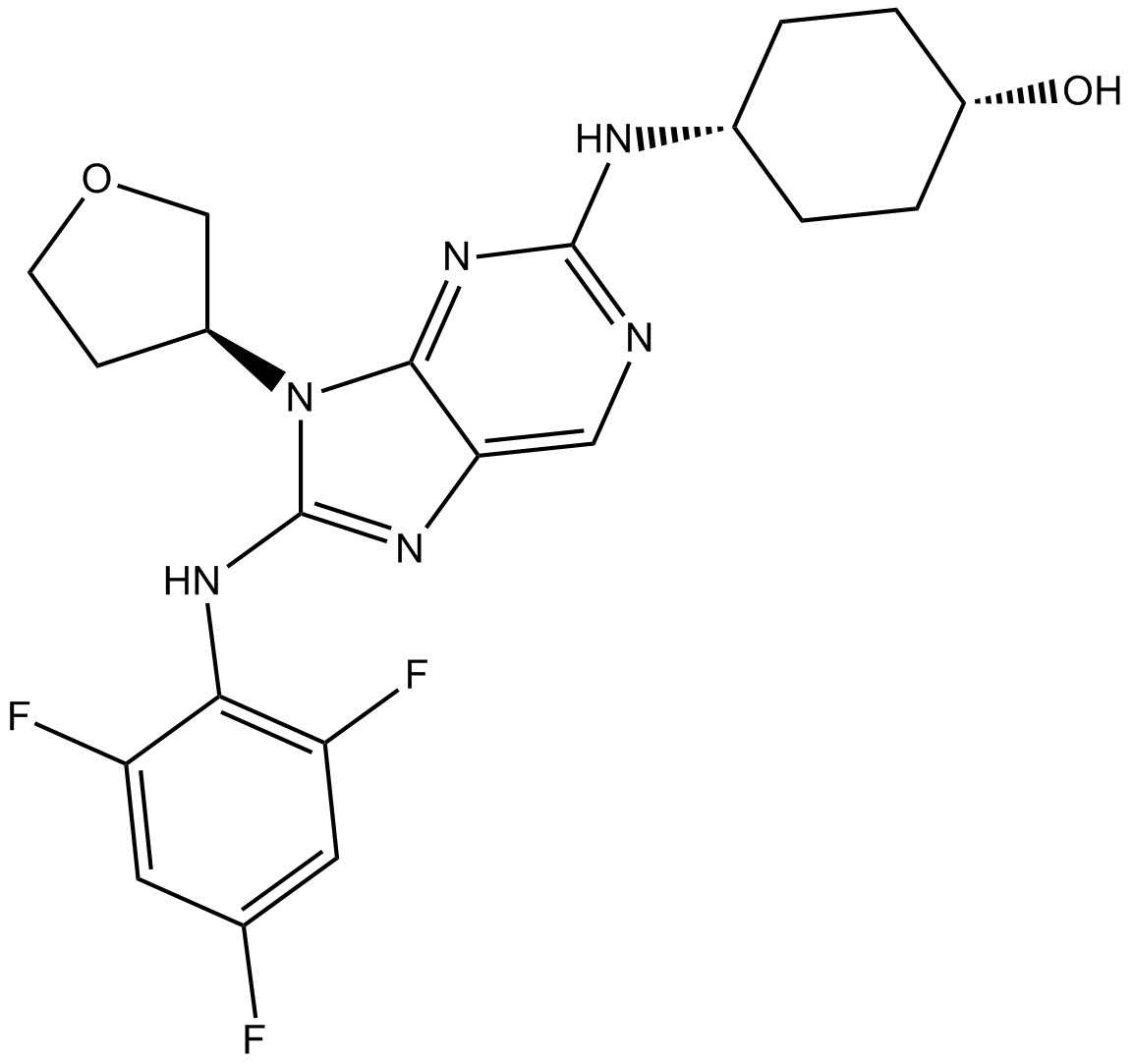CC-930 (Synonyms: Tanzisertib;CC930;CC 930) |
| カタログ番号GC10446 |
強力なJNK阻害剤
Products are for research use only. Not for human use. We do not sell to patients.

Cas No.: 899805-25-5
Sample solution is provided at 25 µL, 10mM.
CC-930 is a potent and selective inhibitor of JNK1/JNK2/JNK3 with IC50 values of 61 nM, 7 nM and 6 nM respectively. [1]
JNKs (c-Jun N-terminal kinases) belong to kinases which were originally indentified. They bind to c-Jun then phosphorylate it on Ser-63 and Ser-73 which located in its transcriptional activation domain. JNKs belong to MAPK family. They contain ten isforms encoded by three genes: JNK1, JNK2 and JNK3. They are 46 KD or 55 KD protein. They play an important role in stress stimuli, such as heat shock, cytokines, and osmotic shock. They are also responsive to the cellular apoptosis pathway and T cell differentiation. They are activated through a dual phosphorylation of Thr and Tyr residues within a Thr-Pro-Tyr motif which located in kinase subdomain. JNKs modify the activity of many proteins that act in the nucleus reside or at the mitochondria. JNKs activate the downstream molecules which include p53, c-Jun, ELK1, SMAD4 and HSF1. JNKs regulate several important cellular functions, such as cell growth, survival, differentiation and apoptosis.[2]
CC-930 kinetically competitive with ATP in the phosphorylation of the substrate c-Jun against all isoforms of JNK with Ki values of 44 ± 3 nM (JNK1), 6.2 ± 0.6 nM and IC50 value of 5 nm for JNK3. EGFR is the only non-MAP kinase which inhibited more than 50% at 3 M. It did not inhibit greater than 50% against 22 diverse non-kinase enzymes at 10 M.[1] CC-930 reduced the phosphorylation of c-Jun the stimulated by TGF β at 1 μM which is a clinically relevant concentration in fi broblasts[3] CC-930 also was showed the potent antifibrotic founctions in the TSK1 model. CC-930 reduced hypodermal thickening with a dose-dependent manner by up to 85±4% in TSK1 mice.[3] CC-930 has no effect on kidney hypertrophy, blood pressur, podocyte loss, glomerular fibrosis in diabetic spontaneously hypertensive rats (SHR). However, CC-930 reduced the levels of ccl2 mRNA in diabetic kidneys[4].
References:
[1]. Plantevin Krenitsky V, Nadolny L, Delgado M, Ayala L, Clareen SS, Hilgraf R, Albers R, Hegde S, D'Sidocky N, Sapienza J et al: Discovery of CC-930, an orally active anti-fibrotic JNK inhibitor. Bioorg Med Chem Lett, 22(3):1433-1438.
[2]. Waetzig V, Herdegen T: Context-specific inhibition of JNKs: overcoming the dilemma of protection and damage. Trends Pharmacol Sci 2005, 26(9):455-461.
[3]. Reich N, Tomcik M, Zerr P, Lang V, Dees C, Avouac J, Palumbo K, Horn A, Akhmetshina A, Beyer C et al: Jun N-terminal kinase as a potential molecular target for prevention and treatment of dermal fibrosis. Ann Rheum Dis, 71(5):737-745.
[4]. Lim AK, Ma FY, Nikolic-Paterson DJ, Ozols E, Young MJ, Bennett BL, Friedman GC, Tesch GH: Evaluation of JNK blockade as an early intervention treatment for type 1 diabetic nephropathy in hypertensive rats. Am J Nephrol, 34(4):337-346.
Average Rating: 5 (Based on Reviews and 30 reference(s) in Google Scholar.)
GLPBIO products are for RESEARCH USE ONLY. Please make sure your review or question is research based.
Required fields are marked with *




















